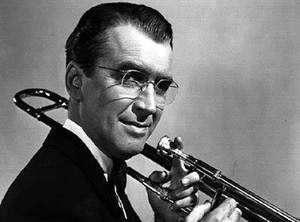The Glenn Miller Story – Re-Played
[caption id="attachment_32481" align="alignleft" width="150"] Review by George Fleeton[/caption]
On May 12 I was invited to introduce a screening of The Glenn Miller Story (1954) in the Queen’s Film Theatre Belfast, as part of the Bealtaine Festival 2013 – a national celebration of creativity as we age (Bealtaine is the Irish word for May).
Review by George Fleeton[/caption]
On May 12 I was invited to introduce a screening of The Glenn Miller Story (1954) in the Queen’s Film Theatre Belfast, as part of the Bealtaine Festival 2013 – a national celebration of creativity as we age (Bealtaine is the Irish word for May).
I have now done nearly sixty of these introduced screenings there in recent years, every one a pleasure.
 Review by George Fleeton[/caption]
On May 12 I was invited to introduce a screening of The Glenn Miller Story (1954) in the Queen’s Film Theatre Belfast, as part of the Bealtaine Festival 2013 – a national celebration of creativity as we age (Bealtaine is the Irish word for May).
Review by George Fleeton[/caption]
On May 12 I was invited to introduce a screening of The Glenn Miller Story (1954) in the Queen’s Film Theatre Belfast, as part of the Bealtaine Festival 2013 – a national celebration of creativity as we age (Bealtaine is the Irish word for May).
***
You could always trust a James Stewart film. And, when it was allowed, as an actor he had a deft, affective comic touch which invariably earned that trust. But his mature films, for Hitchcock and for Anthony Mann in the 1950’s, in which he played troubled, querulous, lonely characters, I have always considered to be more intriguing than his earlier comedies. These films were even contradictory – in that Stewart was playing against that comic grain – and so, when we scrutinised them, we found emotional density in films such as Rear Window, The Man Who Knew Too Much and Vertigo, and in his Anthony Mann westerns like The Naked Spur, The Far Country and The Man from Laramie – even the titles still resonate today. These films were light years away from It’s a Wonderful Life, or Harvey and the man who talked to rabbits. [caption id="attachment_38905" align="alignright" width="300"] Actor James Stewart played the late Glenn Millar in the silver screen during the 1950’s.[/caption]
Between times Stewart had had a distinguished WW2 career in the US Air Force, and this brings us neatly to the film under review – a romanticised, uncontroversial, purported biography of real life character Glenn Miller, whom Stewart knew.
Interestingly no-one has yet come forward with a film biography of James Stewart? But would it work without Daniel Day Lewis?
The first film, I think, I ever saw was The Greatest Show on Earth, made two years before The Glenn Miller Story (TGMS), and so James Stewart has been part of my movie going life from the very start.
The films he made with Anthony Mann (a much better director of westerns than John Ford, in my view) helped to re-invent his versatility as an actor: now he was a tougher, more pained and selfish protagonist – but not in this one film, from that same period, where indeed he reverted to his homely, sentimental, appealing self, replaying Glenn Miller.
So is The Glenn Miller Story a tongue-in-cheek parody? Is it not a bit too mannered, lazy, indifferent? (We know that Mrs Miller was not a fan).
When we remember that 1954 was also the year of Kurosawa’s Seven Samurai, Fellini’s La Strada and Elia Kazan’s On the Waterfront it puts TGMS into a harsh and competitive context.
As those titles remind us now, cinema’s power to connect and to upset audience expectation had become pre-eminent, and actors such as James Stewart were going to be left behind.
Today this film may look conventional and dated, when placed alongside such estimable contemporaries; it is a slow starter, there is no ‘real’ music for over half an hour; the Louis Armstrong and Gene Krupa cameos, in theBasin Street Blues number, are simply a curiosity, a bit of padding; the Little Brown Jug motif becomes a bit embarrassing; the structure of the film is overbalanced in that the search for ‘a band with a radical personality’ takes up far more screen time than The Glenn Miller Band in full flight; but the Frances Langford cameo, at the end, is well worth waiting for; and when the flight doesn’t reach Paris on that fateful day in December 1944, I challenge you not to sniffle or to pretend to clear your throat.
But music and films like this would be swept aside, within two years, by Elvis Presley, James Dean and Rock ‘n’ roll.
The real Miller was more square-jawed than this interpretation: a strict band manager, a fusspot, perfectionist arranger and musician but TGMS has ensured that his tribute bands have stayed on the road for 70 years (indeed I am going to see one in Dublin in September), while we struggle to remember the music of his great rivals in the 30’s and 40’s such as Benny Goodman and others.
Yes. the nostalgia here is a bit heavy handed, and actress June Allyson is a bit phoney-baloney, but there is affection in the detail and, for my money, the theatrical conceits of the film still work (otherwise I wouldn’t be here talking and writing about it).
On a personal note, after my mother had been evacuated to the shores of Lough Neagh, during the Blitz in Belfast, she went one night to a big band concert in an RAF base near Antrim, then being used by the US Air Force around the time of D-Day.
It was the Glenn Miller Band, with Bob Hope, entertaining the troops in Europe, and Frances Langford sang Chattanooga-choo-choo.
And the name of that base? Langford Lodge! You couldn’t make it up – and then I was dragged screaming and shouting to see this film ten years later in 1954.
Actor James Stewart played the late Glenn Millar in the silver screen during the 1950’s.[/caption]
Between times Stewart had had a distinguished WW2 career in the US Air Force, and this brings us neatly to the film under review – a romanticised, uncontroversial, purported biography of real life character Glenn Miller, whom Stewart knew.
Interestingly no-one has yet come forward with a film biography of James Stewart? But would it work without Daniel Day Lewis?
The first film, I think, I ever saw was The Greatest Show on Earth, made two years before The Glenn Miller Story (TGMS), and so James Stewart has been part of my movie going life from the very start.
The films he made with Anthony Mann (a much better director of westerns than John Ford, in my view) helped to re-invent his versatility as an actor: now he was a tougher, more pained and selfish protagonist – but not in this one film, from that same period, where indeed he reverted to his homely, sentimental, appealing self, replaying Glenn Miller.
So is The Glenn Miller Story a tongue-in-cheek parody? Is it not a bit too mannered, lazy, indifferent? (We know that Mrs Miller was not a fan).
When we remember that 1954 was also the year of Kurosawa’s Seven Samurai, Fellini’s La Strada and Elia Kazan’s On the Waterfront it puts TGMS into a harsh and competitive context.
As those titles remind us now, cinema’s power to connect and to upset audience expectation had become pre-eminent, and actors such as James Stewart were going to be left behind.
Today this film may look conventional and dated, when placed alongside such estimable contemporaries; it is a slow starter, there is no ‘real’ music for over half an hour; the Louis Armstrong and Gene Krupa cameos, in theBasin Street Blues number, are simply a curiosity, a bit of padding; the Little Brown Jug motif becomes a bit embarrassing; the structure of the film is overbalanced in that the search for ‘a band with a radical personality’ takes up far more screen time than The Glenn Miller Band in full flight; but the Frances Langford cameo, at the end, is well worth waiting for; and when the flight doesn’t reach Paris on that fateful day in December 1944, I challenge you not to sniffle or to pretend to clear your throat.
But music and films like this would be swept aside, within two years, by Elvis Presley, James Dean and Rock ‘n’ roll.
The real Miller was more square-jawed than this interpretation: a strict band manager, a fusspot, perfectionist arranger and musician but TGMS has ensured that his tribute bands have stayed on the road for 70 years (indeed I am going to see one in Dublin in September), while we struggle to remember the music of his great rivals in the 30’s and 40’s such as Benny Goodman and others.
Yes. the nostalgia here is a bit heavy handed, and actress June Allyson is a bit phoney-baloney, but there is affection in the detail and, for my money, the theatrical conceits of the film still work (otherwise I wouldn’t be here talking and writing about it).
On a personal note, after my mother had been evacuated to the shores of Lough Neagh, during the Blitz in Belfast, she went one night to a big band concert in an RAF base near Antrim, then being used by the US Air Force around the time of D-Day.
It was the Glenn Miller Band, with Bob Hope, entertaining the troops in Europe, and Frances Langford sang Chattanooga-choo-choo.
And the name of that base? Langford Lodge! You couldn’t make it up – and then I was dragged screaming and shouting to see this film ten years later in 1954.
***
George Fleeton is giving the pre-performance talk – in the Gaiety Theatre Dublin on Wednesday June 05 at 6.30pm – before the opening night of a new production of Verdi’s opera La Traviata. Details at www.lyricoperaproductions.com © George Fleeton]]>

























